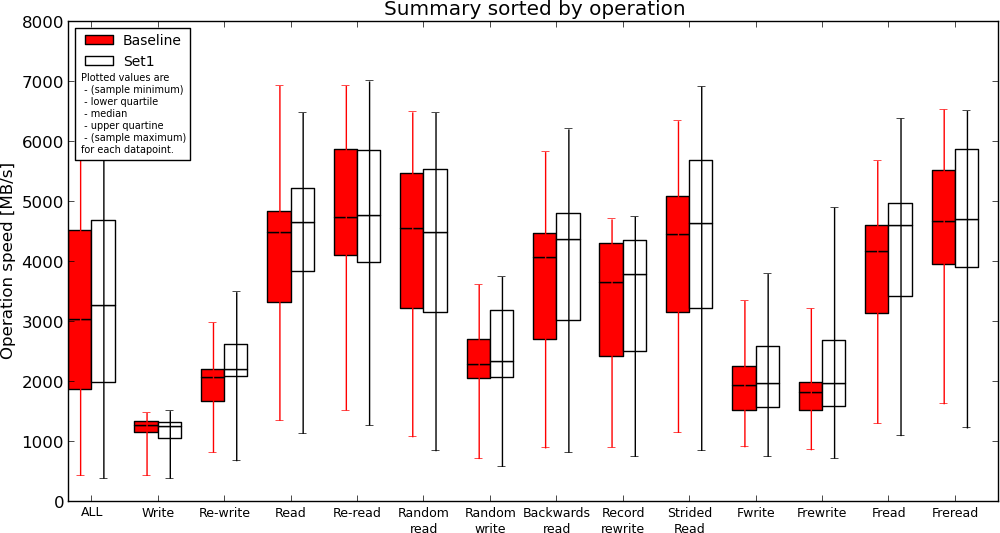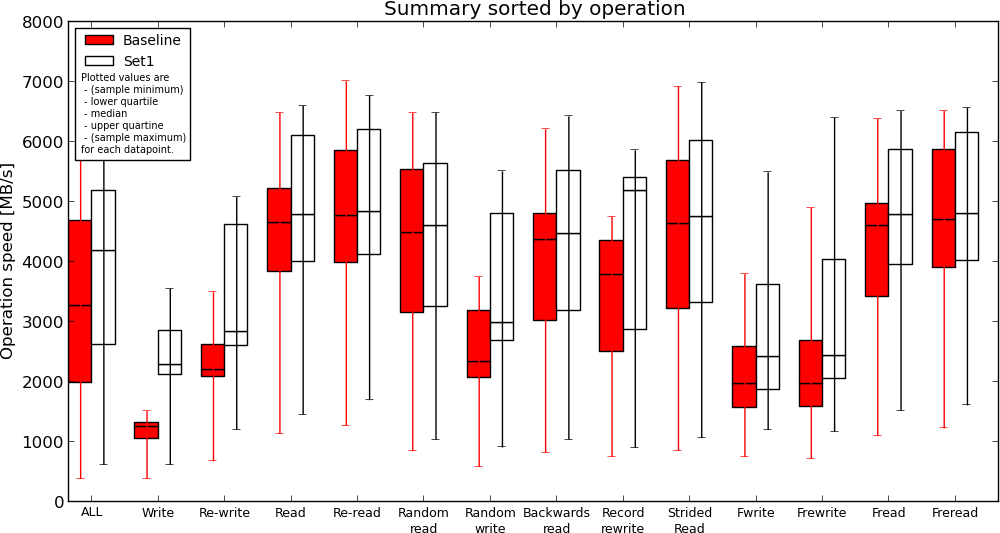I'm exploring the possibility to speed-up my cloud database so I've run some basic tests against storage options available to Amazon EC2 instances. The instance was m1.large with High I/O performance and two additional disks with the same size:
- /dev/xvdb - type EBS
- /dev/xvdc - type instance storage
Both are Xen para-virtual disks. The difference is that EBS is persistent across reboots while instance storage is ephemeral.
hdparm
For a quick test I used hdparm. The manual says:
-T Perform timings of cache reads for benchmark and comparison purposes.
This displays the speed of reading directly from the Linux buffer cache
without disk access. This measurement is essentially an indication of
the throughput of the processor, cache, and memory of the system under test.
-t Perform timings of device reads for benchmark and comparison purposes.
This displays the speed of reading through the buffer cache to the disk
without any prior caching of data. This measurement is an indication of how
fast the drive can sustain sequential data reads under Linux, without any
filesystem overhead.
The results of 3 runs of hdparm are shown below:
# hdparm -tT /dev/xvdb /dev/xvdc
/dev/xvdb:
Timing cached reads: 11984 MB in 1.98 seconds = 6038.36 MB/sec
Timing buffered disk reads: 158 MB in 3.01 seconds = 52.52 MB/sec
/dev/xvdc:
Timing cached reads: 11988 MB in 1.98 seconds = 6040.01 MB/sec
Timing buffered disk reads: 1810 MB in 3.00 seconds = 603.12 MB/sec
# hdparm -tT /dev/xvdb /dev/xvdc
/dev/xvdb:
Timing cached reads: 11892 MB in 1.98 seconds = 5991.51 MB/sec
Timing buffered disk reads: 172 MB in 3.00 seconds = 57.33 MB/sec
/dev/xvdc:
Timing cached reads: 12056 MB in 1.98 seconds = 6075.29 MB/sec
Timing buffered disk reads: 1972 MB in 3.00 seconds = 657.11 MB/sec
# hdparm -tT /dev/xvdb /dev/xvdc
/dev/xvdb:
Timing cached reads: 11994 MB in 1.98 seconds = 6042.39 MB/sec
Timing buffered disk reads: 254 MB in 3.02 seconds = 84.14 MB/sec
/dev/xvdc:
Timing cached reads: 11890 MB in 1.99 seconds = 5989.70 MB/sec
Timing buffered disk reads: 1962 MB in 3.00 seconds = 653.65 MB/sec
Result: Sequential reads from instance storage are 10x faster compared to EBS on average.
IOzone
I'm running MySQL and sequential data reads are probably over idealistic scenario. So I found another benchmark suite, called IOzone. I used the 3-414 version built from the official SRPM.
IOzone performs multiple tests. I'm interested in read/re-read, random-read/write, read-backwards and stride-read.
For this round of testing I've tested with ext4 filesystem with and without journal on both types of disks. I also experimented running Iozone inside a ramfs mounted directory. However I didn't have the time to run the test suite multiple times.
Then I used iozone-results-comparator to visualize the results. (I had to do a minor fix to the code to run inside virtualenv and install all missing dependencies).
Raw IOzone output, data visualization and the modified tools are available in the aws_disk_benchmark_w_iozone.tar.bz2 file (size 51M).
Graphics
EBS without journal(Baseline) vs. Instance Storage without journal(Set1)

Instance Storage without journal(Baseline) vs. Ramfs(Set1)

Results
- ext4 journal has no effect on reads, causes slow down when writing to disk. This is expected;
- Instance storage is faster compared to EBS but not much. If I understand the results correctly, read performance is similar in some cases;
- Ramfs is definitely the fastest but read performance compared to instance storage is not two-fold (or more) as I expected;
Conclusion
Instance storage appears to be faster (and this is expected) but I'm still not sure if my application will gain any speed improvement or how much if migrated to read from instance storage (or ramfs) instead of EBS. I will be performing more real-world test next time, by comparing execution time for some of my largest SQL queries.
If you have other ideas how to adequately measure I/O performance in the AWS cloud, please use the comments below.
Comments !